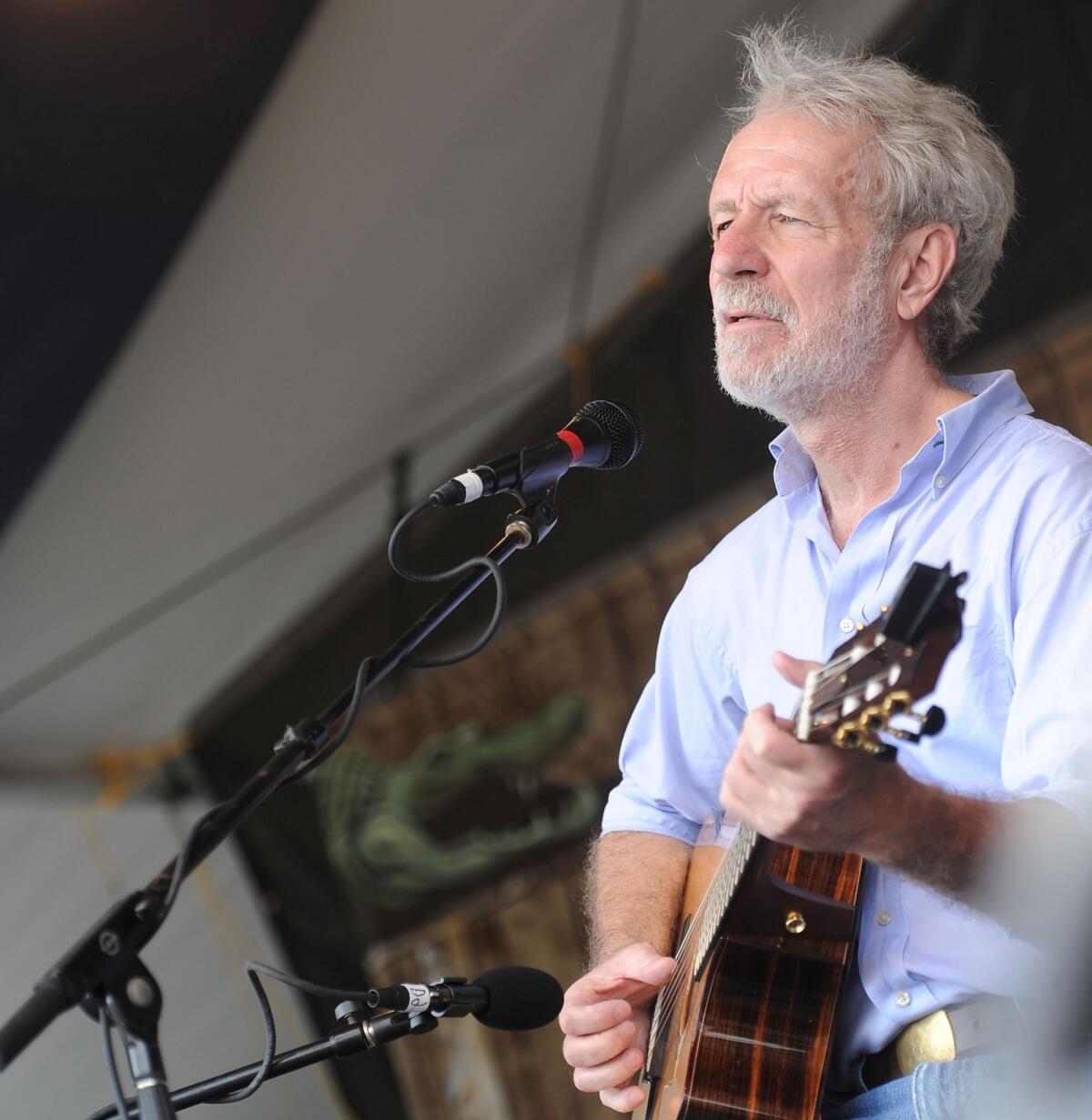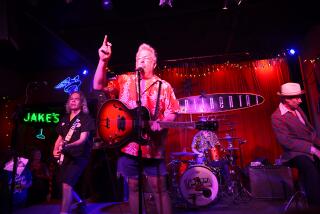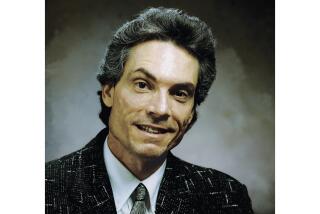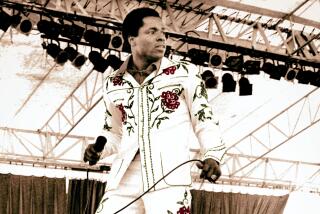Appreciation: Singer-songwriter Jesse Winchester (1944-2014)

It was an offhanded comment by singer-songwriter Jesse Winchester, but it stopped Elvis Costello cold when he was chatting with Winchester for his short-lived music-interview series “Spectacle” on the Sundance Channel a few years ago.
In an aside, the inordinately gifted songwriter casually identified “The Brand New Tennessee Waltz” (one of the first songs for which he’d gained acclaim in the early 1970s) as the first song he’d ever written. Then he nonchalantly moved on to finish the main point he was making about the art of writing songs.
Costello interrupted, in utter disbelief: “You mean to say that was actually the first song you ever wrote?”” He knew all too well that it had been widely recorded by artists including Joan Baez, the Everly Brothers, Ralph Stanley and Patti Page, whose 1950 “Tennessee Waltz” was the reference point for Winchester’s song.
PHOTOS: Notable deaths of 2014
Winchester, who died Friday at age 69 from bladder cancer, smiled and nodded sheepishly. It was characteristic of the disarming and endearing humility of a man lauded by other musicians and critics but who left little footprint of his own on the masses.
During his performance on that show -- a round-table session that also featured Sheryl Crow, Neko Case, Ron Sexsmith and Costello -- Winchester brought Case to tears with one of his most recent songs, “Sham-A-Ling-Dong-Ding,” a sweet reflection on the power of the seemingly silly songs people latch onto in their teens.
“That’s it Jesse, the show’s over,” Costello said shortly after his performance. “You’ve finished me off -- again.”
Of the dozen or so albums Winchester released over a stretch of 40 years starting in 1970, none cracked the Top 100 of Billboard’s national sales chart. His most successful was 1977’s “Nothing But a Breeze,” which reached No. 115. He placed just two singles on the Billboard Hot 100, including the album’s title track, which peaked at No. 86 in 1977. The closest he ever came to a hit of his own was “Talk Memphis,” which reached No. 32 in 1981.
PHOTOS: Concerts by The L.A. Times
But among other songwriters, he was a revered figure.
Jimmy Buffett recorded several of his songs and regularly performed Winchester’s “Biloxi” in concert. Emmylou Harris recorded “Defying Gravity” and Wynonna Judd, with her mother Naomi along for a mini-Judds reunion in 1999, took on his song “That’s What Makes You Strong.” The Mavericks had a Top 20 country hit in 1994 with “O What a Thrill,” and George Strait did a version of “A Showman’s Life.”
Sometimes, the love he got from other musicians wasn’t all it was cracked up to be.
“I can remember I did a brief tour with Jimmy Buffett, opening for him,” Winchester told CMT News in 1999. “He’s recorded several of my tunes. Anyway, I began to play one of them in my set and people in the audience were annoyed with me because they thought I was singing one of Jimmy’s songs. It’s kind of the story of my life.”
He was born and raised in the South, and spent much of his early life in Memphis, Tenn., and across the state line in Mississippi, but Winchester moved to Canada in 1967 to avoid being drafted during the Vietnam War.
PHOTOS: Iconic rock guitars and their owners
Later he said he believed there were times it was right to fight for one’s country, but at 22, he didn’t think that was his time. He was discovered in 1970 by the Band’s lead guitarist, Robbie Roberston, who produced his acclaimed debut album that year. That recording led to a major-label deal in the U.S. with Bearsville, one of the Warner Bros. family of labels.
In 1977, President Carter issued a blanket pardon for U.S. citizens who left the country during the Vietnam War, and Winchester resumed touring but continued living in Canada.
Many of the songs he wrote while living in exile from his native country touched on the facets of life he missed, among them “Yankee Lady,” “Mississippi You’re on My Mind” and “Talk Memphis.”
Several of those turned up on the 2012 album “Quiet About It: A Tribute to Jesse Winchester,” which featured Costello and Harris along with Lucinda Williams, James Taylor, Rosanne Cash, Lyle Lovett, Vince Gill, Allen Toussaint and others.
A year earlier, Winchester underwent treatment for esophogeal cancer, an often terminal form, and delighted fans when his wife, Cindy, reported a few months later that the treatment had been successful and that doctors had declared him cancer-free.
PHOTOS: Best albums of 2013 | Randall Roberts
Winchester’s songs and his slightly dusky, honey-sweet voice oozed Southern charm. Those songs often traded in the strength he found in allowing an emotional vulnerability to surface. He also had his lighter moments, celebrating the power of a good dance in “Rhumba Man” and the heartbreak of a withering stash in “Twigs and Seeds.”
There also could be a strong spiritual undercurrent to his music, which had deep roots in R&B, soul and country music.
“I write kind of weird gospel music,” and he once told a reporter: ”It’s gospel music sung by someone who’s got one foot in heaven and the other foot, he just can’t seem to pull out of the muck sometimes. I can’t be absolutely positive about things, I’m not sure I’d want to be. It’s your mistakes, it’s your weaknesses that lead you to these revelations, not necessarily your strength.”
That idea was the core of “That’s What Makes You Strong,” one of his own finest performances that was on his 1999 album “Gentleman of Leisure”:
PHOTOS: Celebrities by The Times
If you love somebody
Then that means you need somebody
And if you need somebody
That’s what makes you weak
But if you know you’re weak
And you know you need someone
O it’s a funny thing
That’s what makes you strong
That’s what makes you strong
That’s what gives you power
That’s what lets the meek come sit beside the king
That’s what lets us smile
In our final hour
That’s what moves our souls
And that’s what makes us sing
Here’s his performance of “Sham-A-Ling-Dong-Ding” from “Spectacle,” which just brought tears to two more eyes. Again:
ALSO:
Jesse Winchester: At Home on Both Sides of the Border - See more at: https://latimesblogs.latimes.com/music_blog/2011/09/jesse-winchester-cancer-free.html#sthash.4OSUFJCN.dpuf
Singer-songwriter Jesse Winchester declared ‘cancer-free’
Coachella 2014: 10 rising acts you should know now
Follow Randy Lewis on Twitter: @RandyLewis2
More to Read
The biggest entertainment stories
Get our big stories about Hollywood, film, television, music, arts, culture and more right in your inbox as soon as they publish.
You may occasionally receive promotional content from the Los Angeles Times.






